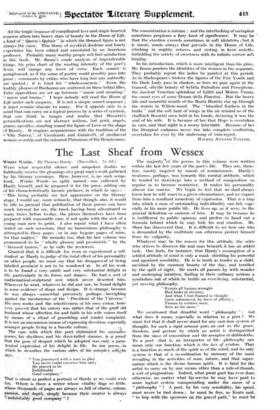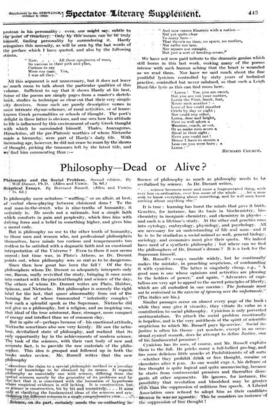The Last Sheaf from Wessex
Winter Wails: By Thomas Hardy. (Macmillan. 7s. 6d.) WITH what respectful silence and unspoken doubts we habitually_ receive the gleanings of a great man''s work gathe5ed,,_ by his literary- e;.-c.- ecutOys; Here, _however,: 4. no,such serap7_ book. ..- Winter: . Words—so. aptly named+-was collected by Hardy himself, -and he prepared it for the press, adding one of his CharaCieristically laconic prefacei, in which he says :- "This being probably my last appearance on the literary stage,woUld say, more seriously, that though, alas, it would' be idle to pretend that. publication of these poems: can .have much interest_for Inc, the track having- been adventured- so many times , before to-day, the. pieces_thernselves. have been prepared with reasonable care, if not -quite- with the• zest of a young; man- new to print. I also repeat what I have often stated on such occasions, that no harmonious philosophy is attempted in these pages—or in any bygone pages of Mine, for that matter." He remarks too, that his last Volume was pronounced to be " wholly gloomy and pessimistic " by. the " licensed tasters," as he calls the reviewers. .
Granted- that it is difficult for even so experienced a self- student as Hardy to judge of the total effect of his personality on other people, we must say that his disapproval of being labelled pessimist is not to be wondered at. In all his work is to be found a very subtle and very substantial delight in life, particularly in its forms and shapes. He had a sort of mathematical-sculptural zest which never deserted_ him.- Wherever he went, whatever he did and saw, he found delight in some evidence of shape and design. -W-is-strange; because he was always—somewhat perversely perbapsinveighing against the incoherence of the " President of the Universe." His own works and the selectiv.eneSS of his own vision, _how- ever, proved that his outcry'was rather that- of the gruff old husband whose affection fOr -and -faith; in his wife .'oiees itself by means of- a ritual of grumbling and tender; complaint. It is not an uncommon means of ex-pressing devotion,, especially amongst people living in a bucolic culture.,.. ft, The care with which this poet elaborate?' leis onoingto- poems,' his rhythnis, 'and his dove-tailed stanzas, is a. proof that the pose of despair which he :adopted wasionly. a para- expres4on of his.' delight life. In one poem,..-in 'which he describes the various bides. of his complex -self the lays,
You' journeyed with a man so glad You never could conceive him sad ; He proved- to be - Indubitably -
-
Good company." •
That is about as perfect a portrait of Hardy as we could wish for, . Where - is there- a writer whose vitality flags so little, whose thotisands of pages-are always so lull of charm, colour:- passion, and. depth, simply -because their creator is always • ‘ -indubitably good company-" The inajoritv•of the poems in :this volume were written within the last few years of the poet's life. They are, there- fore, mostly inspired by moods of reminiscence: Hardy's Weakness, :perhaps,' was-towavis this mental attitude, which he tended' to Stereotype into a method of composition so regular as to become :restrictive. It makes his personality almost too concise. We begin to feel that we shall always
know how he will react to a given circumstance, and we expect from him a resultant monotony of expression. That is a trap into which a man of outstanding individuality can fall, espe- cially in his more public life. He lives up, as it were, to the general definition or- cartoon of him. It may be because he is indifferent to public opinion, and •prefers to hand out a formula behind which he may hide his real emotion. Mr.
Shaw has discOvered that. It is difficult to see how one who is demanded by the multitude can otherwise protect himself from its Vulgarity. -
Whatever may be the reason for this attitude, the critic who strives to discover the real man - beneath it- has an added task. One finds, for instance, that Hardy's assumption of a
settled attitude of mind is only a mask shielding his powerful and agonized sensibility. He is in truth as tender as a child, ravished by the common beauty of the day, and terrified by the spell of night. He meets all passers by with wonder and unsleeping intuition, finding in their ordinary actions a symbolism out of which- he builds an ever-living, substantial, yet moving philosophy. • " Events all human:wrought
- Had -looks of divinity,
And what i fore-framed in thmight Grew substaneed, by force of affinity ; Visions to verities came, Seen as the same."
We mentioned that dreadful word " philosophy " ; but what does it mean, especially in relation to: a poet ? We must feel that it shall never stand for any cast-iron system of
thought, for such- a rigid armour puts an end to' the grace, freedom, and gesture by which an artist is distinguished from the slave of convention and the acceptor of shibboleths. To a poet---that .is, an interpreter of. life—philosophy can
mean only one function, which- is the lore of wisdom. That is a function as Much of the spirit as of the Mind, and its only system is that of _a co-ordination by - memory. Of the most revealing in the activities of man, nature, and that super- nature which is the divine human spirit. It is fatal for the artist to carry on by any means other than a rule-of-thumb, a Sort of pragmatism. Indeed, what great poet has ever done otherwise, no matter what lip-service he may have paid to some logical system masquerading under the name of a " philosophy" ?. A poet,. by his very sensibility,: his speed, Must never be tied down ; he must be free, as Keats said,. " to hop with- the sparrows on the gravel path," lie must-be- protean in his personality even; one might say, subtle to thrpoint -cfrtreachery.--Ortlyity-tlffrmeans can-he-1W truly hiinself, finding personality by surrendering it. Hardy recognizes this necessity, as will be seen by the last words of the preface which I have quoted, and alsb by the following
st4nza. . • •
" Now, . . . All.these.speojmens of man,
So various in their pith and plan, Curious to say
Were one man. Yea,
I was all they." -
X11 this argument is not unnecessary, but it does not leave ust much room to talk about the particular qualitiei of this volume. Sufficient to say that it shows Hardy at his best. Soine of the poems are simply pages from a master's sketch- book, studies in technique so clear cut that their very simpli- -city deceives. Some such are purely descriptive verses in most intricate rhyme-schemes; of rural activities, or of lesser- .knimn Greek personalities or schools of thought. The poet's delight in these latter is obvious, and one sees how his attitude to fife is influenced by this environment of early Greek thought with which he surrounded liiinself. Tholes,- Anaxagoras, Ifiraeleitus, all the pre-Platonic worthies of whom Nietzsche made a hierarchy; were part of Hardy's daily life. With increasing age, however, he did not cease to roam by the shores
of ;thought, picking the treasures, left by the latest tide, and we find him commenting thus :—
" And now comes Einstein with a notion— -- Noryet quite -clear- To many here—
That there's Ito time, no space, no motion, - Nor rathe nor late, Nor square nor straight, But just a sort of bending-ocean,
We have not now paid tribute to the dramatic genius which still burns in this last work, making many of the poems intense with such human aching that the heart is wounded as we read them. Nor have we said much about the -fine youthful lyricism controlled by sixty years of technical practice, controlled but never subdued, so that such a Leigh Hunt-like lyric as this can find room here..
" Lorna Yes, you are sweet,
But you are not your mother, Lorna the First, frank, feat, Never such another Love of her could smother Oriefs by day or night ;
Nor could any other,
Lorna, dear and bright, Ever so well adorn a Mansion, coach, or cot,
Or so make men scorn a Rival in their sight ;
Even you could not
Hence I have to mourn a Loin ere you were born ; a
Lorna ! "
RICHARD CIIURCH,























































 Previous page
Previous page